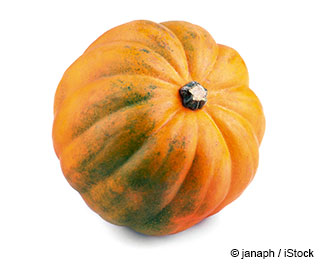The Skinny on Squash
Botanical name: Cucurbita morschata

While you may think of squash as a vegetable, it's technically a fruit,1 belonging to the gourd family.2 Squash varieties have different appearances — some are green and squat,3 like the acorn squash, while others are long and light-colored, like the banana squash.4
When selecting squash, choose one that's heavier for its size,5 which translates into more edible flesh, along with a firm, dry and intact stem. Squash thrives on long-trailing vines, and have a creamy texture, a luscious, nutty flavor and an aroma with just a hint of sweetness.
Squash can be a lovely side dish when baked or steamed in halves or chunks with a pat of butter and salt, with skin intact (best in a pan with an inch of water to retain moisture). With additions like honey, cinnamon, walnuts, fresh coconut or orange juice, or with onions, carrots or other vegetables, this plant-based food opens a whole new vista of culinary opportunities.
Because squash has tough skin, you can store it for up to a few months in a cool, dark place. Just remember to keep it away from fruits, especially bananas. Once cut, refrigerate the unused portion and use it within a week.6 Butternut squash can be a substitute for pumpkin in certain recipes.
Health Benefits of Squash
Squash contains 68 micrograms of vitamin A, a powerful antioxidant essential for good skin,7 vision8 and mucous membranes.9 What's more, polyphenolic carotenoid/flavonoids such as beta-carotenes10 and cryptoxanthin-ß11 convert to vitamin A in the body for a one-two punch of protection. Research reveals that vitamin A may protect against the risk of lung12 and mouth13 cancers.
Every 100-gram serving of squash offers 12.3 milligrams of vitamin C, providing infection protection,14 among other things. The potassium and calcium content in squash is also beneficial, with 350 milligrams and 28 milligrams respectively, along with vitamin E, thiamin, niacin, folate, magnesium, riboflavin and pantothenic acid. Check out its nutrition facts below for more information.15
Summer Squash Nutrition Facts
Serving Size: 3.5 ounces (100 grams), raw
| Calories |
34 |
|
| Total Fat |
0.13 g |
|
| Saturated Fat |
0.027 g |
|
| Cholesterol |
0 mg |
|
| Sodium |
4 mg |
|
| Total Carbohydrates |
8.59 g |
|
| Dietary Fiber |
1.5 g |
|
| Sugar |
2.2 g |
|
| Protein |
0.95 g |
|
| Calcium 28 mg |
Iron |
0.58 mg |
Studies on Squash
Squash may have built-in anticancer benefits due to its high level of carotenes per serving. While studies show carotenoid concentrations in blood are biomarkers of fruit and vegetable intake offering cancer protection, one study in particular explored a possible association between carotene presence and breast cancer. Researchers concluded that among six carotenes tested, only β-carotene intake was significantly associated with reduced breast cancer risk.16
Squash seeds provide lots of dietary fiber and unsaturated fatty acids, along with protein, minerals and vitamins. Squash seeds also contain tryptophan, an amino acid that converts to gamma-aminobutyric acid (GABA), which is the main inhibitory neurotransmitter that concentrates on motor decision speed.17 The tryptophan in squash seeds also may be crucial in regulating the endocrine pancreas,18 which in turn regulates the blood glucose in the body.
To bake your own squash seeds, separate them from the squash, spread them out on a cookie sheet, and toast them lightly at 160 to 170 degrees Fahrenheit for 15 to 20 minutes. The low temperature decreases damage to healthy oils like linoleic acid (polyunsaturated omega-6 fatty acid) and oleic acid — the same non-hydrogenated substance found in olive oil.19
Squash Healthy Recipes:
Hazelnut Squash Soup

|
Ingredients:
|
|
✓ 1 ½ cups mashed cooked acorn squash
|
✓ 1 cup finely chopped hazelnuts
|
✓ ½ cup finely chopped onion
|
|
✓ 1 quart chicken or veggie stock
|
✓ Salt, to taste
|
✓ ¼ teaspoon pepper
|
|
✓ 1 teaspoon white miso
|
|
|
Procedures:
- Combine squash, hazelnuts, onion and stock in saucepan. Bring to a boil; cover and simmer 30 minutes, stirring occasionally.
- Stir in salt to taste, pepper and miso. Puree mixture in a food processor and spoon into dishes. Garnish with sour cream if desired.
This recipe makes 4 servings.
Note: Hazelnuts are also known as filberts.
(From "Recipes for Your Nutritional Type" by Dr. Mercola)
Squash Fun Facts
According to the Smithsonian Magazine, the word "squash" comes from the Narragansett Native American word askutasquash, which means "eaten raw or uncooked."20 Squash are one of the oldest known crops — 10,000 years old according to some estimates — and are thought to have originated in Mexico.21
Summary
Beta-carotene is the star in squash, providing powerful antioxidant properties.22 The colorful hues in squash and other vegetables hint at this attribute, which is important for blocking and zapping harmful free radical activity.23 This nutrient turns into vitamin A in the body, which is another desirable benefit for healthy skin, bones, vision and immunity from disease and infection.
Bake squash with butter, salt and pepper to get the true essence of this lovely garden offering. It also makes one of the most delicious soups; try it baked and processed with a softened Granny Smith apple, onion, and a large carrot — yum!